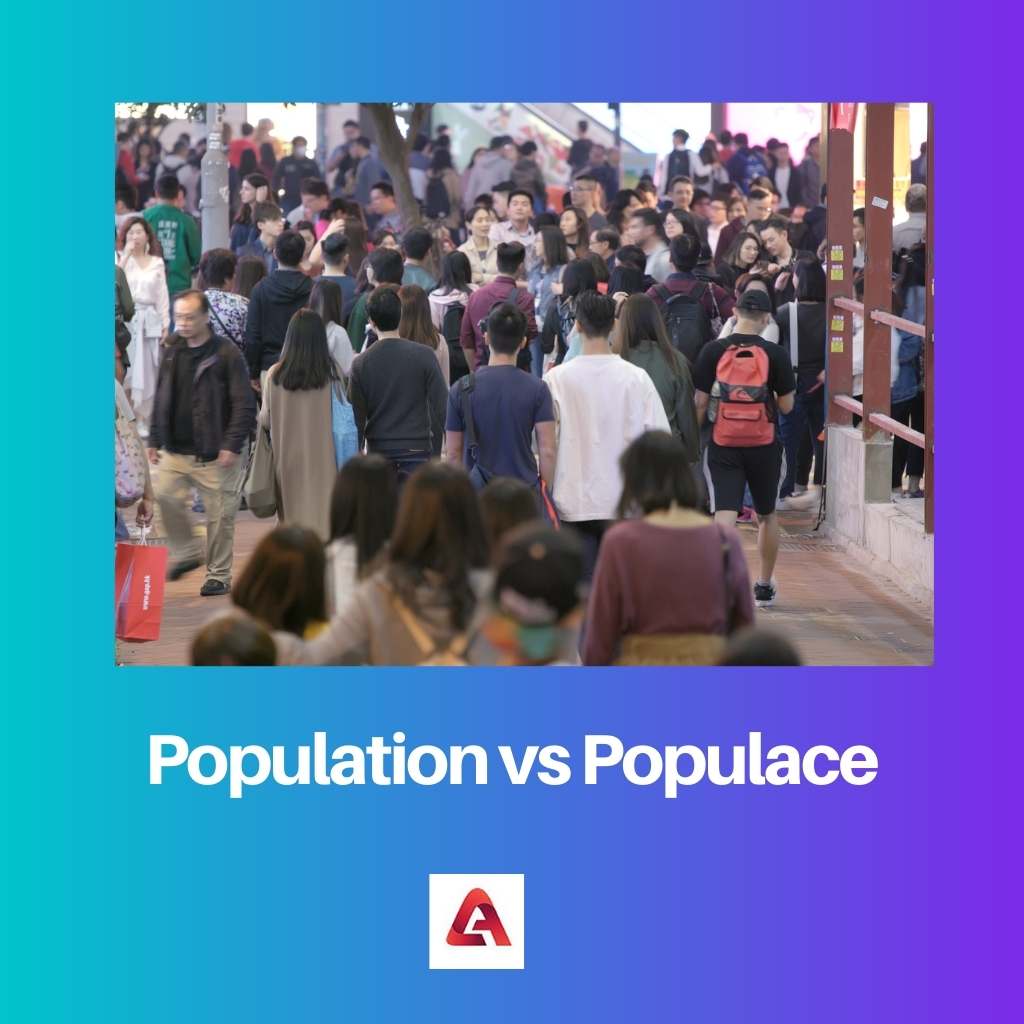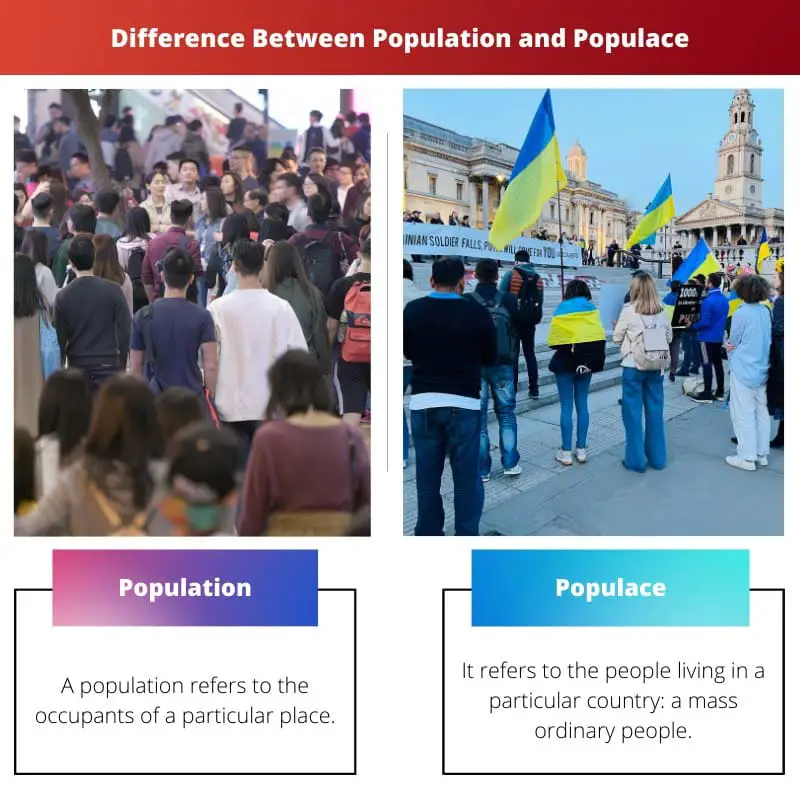The two words have been derived from the Latin word populus which stands for people, but entered English with different meanings. Since the time of origination, the term population refers to cumulative settlers of a place on the other hand, the term populace refers to the common people living in a country. Let us understand the difference between the two terms with the help of more details.
Key Takeaways
- Population refers to the total number of people living in a specific area, while the populace encompasses the general public or common people.
- The population is a quantifiable term used in demographics, whereas the populace is a more abstract concept describing a group’s collective identity.
- Population statistics inform policy decisions and resource allocation, while the term populace discusses public sentiment and social trends.
Population vs Populace
Population is the total number of living things living in a specific area or region. It can be used to describe the people or animals living in a city, state, or country. Populace is a specific group of people with the same characteristics, such as nationality, religion, or political affiliation.

Population is a term that refers to a closely associated group of one kind. A population is subjected to change with time, and these changes can take place in terms of the size of the population. Different fields have different perspectives on the term ‘population.’
On the other hand, populace refers to the ordinary people who live in a country or a place, these people are contrasted with the elite ones. When we use this term, we refer to particular people who are living in a particular area. These people are opposed to privileged or tilted classes.
Comparison Table
| Parameter of Comparison | Population | Populace |
|---|---|---|
| Definition | A population refers to the occupants of a particular place | It refers to the people living in a particular country: a mass ordinary people |
| Origin | 16th century from Latin | 16th century |
| Synonyms | Community, society, citizens | Native, residents, occupiers |
| Antonyms | Foreigner, alien etc. | Royalty, elite, quality etc. |
| Usage in a sentence | The population explosion is a serious problem. The population of India is 1.38 billion | The populace of a country is its people. Many of the city’s populace travel to work by subway or bus |
What is Population?
A population can be defined as a distinct assemblage of entities with identifiable characteristics, such as people and animals, with the objective of the analysis and data collection is called a population. It is the pool of individuals from which a statistical sample is drawn for a study or research. Any selection of individuals which can be grouped together by a common feature can be said to form a population.
The term population is defined differently in different fields for example, in genetics population is defined as a group of organisms that are capable of breeding with each other. The population can be of different types, for example, the population that will occupy a very small area and is smaller in size than this type of population is called as local population. A group of such a closely related local population is further called a meta-population. Populations can occur on various different scales that is, a local population can be restricted to a spatially small area which could be compared to the fish living in one pond.
Whereas in ecology, the term stands for a group of organisms that belong to the same species, inhabit the same geographical area, and can interbreed. Population ecology is a very important area of ecology because it helps in linking ecology to the population at the genetics and evolution levels as well. Any selection of individuals which can be grouped together by a common feature can be said to be a population.

What is Populace?
The term populace originated in the late 16th century which refers to the ordinary people who live in a country or a place, and these people are contrasted with the elite ones. It is used to refer to all the people living in a country. A populace is defined as a group that will form a certain place’s total population. The term was taken from the Latin word populus, which means “people,” but it also explains in the sense of race, nationality, or locality. The term can also be compared with the Spanish word, which is pueblo and is derived from the same Latin root.
In simple language, we can say that the populace stands for the mass or a huge number of people. The term populace refers to a group of people in general, like the masses or a population.
In a very original way, the term is used negatively, which refers to ordinary people, as opposed to rich, privileged ones or royalty. One word which is pronounced the same as ‘populace’ is ‘populous,’ which is an adjective form of it that means that there are many people in an area.
Main Differences Between Population and Populace
- The population is the group of people, whereas, Populace is used to refer to the individuals living in an area who are not included in an elite group.
- Population forms the target group, and populace refers to someone who populates.
- The term population can also refer to the collective inhabitants of a place, whereas populace refers to the inhabitants of the nation.
- We use the term population to define a group of anything, but the populace is never used to define any species other than humans.
- The population is a very flexible term as compared to the populace.


The article effectively highlights the nuanced differences between population and populace. The comparison table is particularly helpful.
The thorough explanation of the differences between population and populace in various contexts, such as ecology and genetics, is quite enlightening.
The explanation of ‘populace’ being used negatively and in the sense of race, nationality, or locality is very intriguing and adds depth to the understanding of the term.
The article does a great job of breaking down the key differences between population and populace, shedding light on the intricacies of these terms and their usage.
The detailed explanations and examples provided for population and populace make this article very informative and clear.
It’s interesting to see the historical origins of these two words and how they have evolved over time to have distinct meanings in English.
The key takeaways effectively explain the concepts of population and populace and their key differences.
The comparison table is a very useful tool to understand the differences between these two often-confused terms.